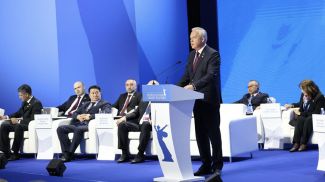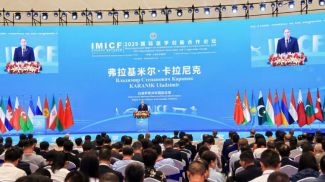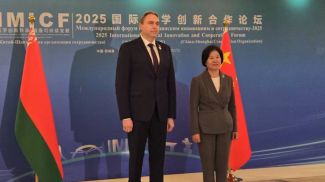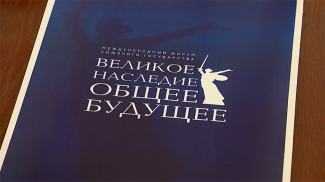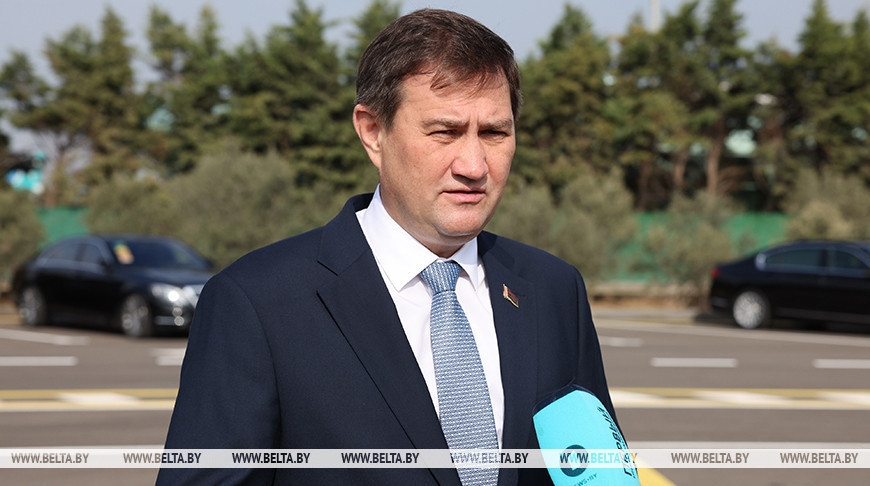
BAKU, 11 November (BelTA) – Lithuania and Latvia are destroying the energy security infrastructure in the region, Belarusian Minister of Foreign Affairs Maksim Ryzhenkov told the media in Baku, BelTA has learned.
According to the minister, ahead of the World Climate Summit, Azerbaijan has developed about a dozen declarations to be adopted during the summit. Belarus joined all the documents, as they meet its approaches.
"These approaches coincide with the Belarusian vision. So we do not hesitate to support our Azerbaijani friends. First of all, it concerns the intensification of work on creating efficient energy storage facilities and infrastructure for electric power transmission between the countries. In this regard, Belarus is developing the relevant infrastructure on its territory and jointly building it with Russia. On the contrary, our neighbors, Lithuania and Latvia, are destroying these chains. I do not know how it meets the declarations, which the Baltic states will probably sign," Maksim Ryzhenkov said.
He recalled that Lithuania and Latvia had decided to withdraw from the unified electricity system of Belarus, Russia, Estonia, Latvia and Lithuania (BRELL). This definitely is out of sync with the principles of ensuring energy security by means of creating reliable multifunctional regional chains.
The summit agenda also includes the issues of limiting methane emissions, water conservation, and sustainable development of green cities. These issues are very important for Belarus. "A number of our cities are switching to electric public transport. Such projects have been implemented in Shklov and Zhodino. Polotsk and Novopolotsk are next in line," the minister cited an example.
Maksim Ryzhenkov also noted that under the Paris Agreement, Belarus has pledged to reduce greenhouse gas emissions by 35% of the 1990 level by 2030, but this year the reduction has already amounted to 40%. According to experts, taking into account the land use and forestry sector absorption, this figure exceeds 62%. It means that actually Belarus has twice exceeded its commitments.
According to the minister, this shows that Belarus is focused on its own standards in the implementation of the Green Agenda, rather than on the figures set by someone from outside. "We are moving forward much faster, better and more confidently than other countries," Maksim Ryzhenkov emphasized.
According to the minister, ahead of the World Climate Summit, Azerbaijan has developed about a dozen declarations to be adopted during the summit. Belarus joined all the documents, as they meet its approaches.
"These approaches coincide with the Belarusian vision. So we do not hesitate to support our Azerbaijani friends. First of all, it concerns the intensification of work on creating efficient energy storage facilities and infrastructure for electric power transmission between the countries. In this regard, Belarus is developing the relevant infrastructure on its territory and jointly building it with Russia. On the contrary, our neighbors, Lithuania and Latvia, are destroying these chains. I do not know how it meets the declarations, which the Baltic states will probably sign," Maksim Ryzhenkov said.
He recalled that Lithuania and Latvia had decided to withdraw from the unified electricity system of Belarus, Russia, Estonia, Latvia and Lithuania (BRELL). This definitely is out of sync with the principles of ensuring energy security by means of creating reliable multifunctional regional chains.
The summit agenda also includes the issues of limiting methane emissions, water conservation, and sustainable development of green cities. These issues are very important for Belarus. "A number of our cities are switching to electric public transport. Such projects have been implemented in Shklov and Zhodino. Polotsk and Novopolotsk are next in line," the minister cited an example.
Maksim Ryzhenkov also noted that under the Paris Agreement, Belarus has pledged to reduce greenhouse gas emissions by 35% of the 1990 level by 2030, but this year the reduction has already amounted to 40%. According to experts, taking into account the land use and forestry sector absorption, this figure exceeds 62%. It means that actually Belarus has twice exceeded its commitments.
According to the minister, this shows that Belarus is focused on its own standards in the implementation of the Green Agenda, rather than on the figures set by someone from outside. "We are moving forward much faster, better and more confidently than other countries," Maksim Ryzhenkov emphasized.





